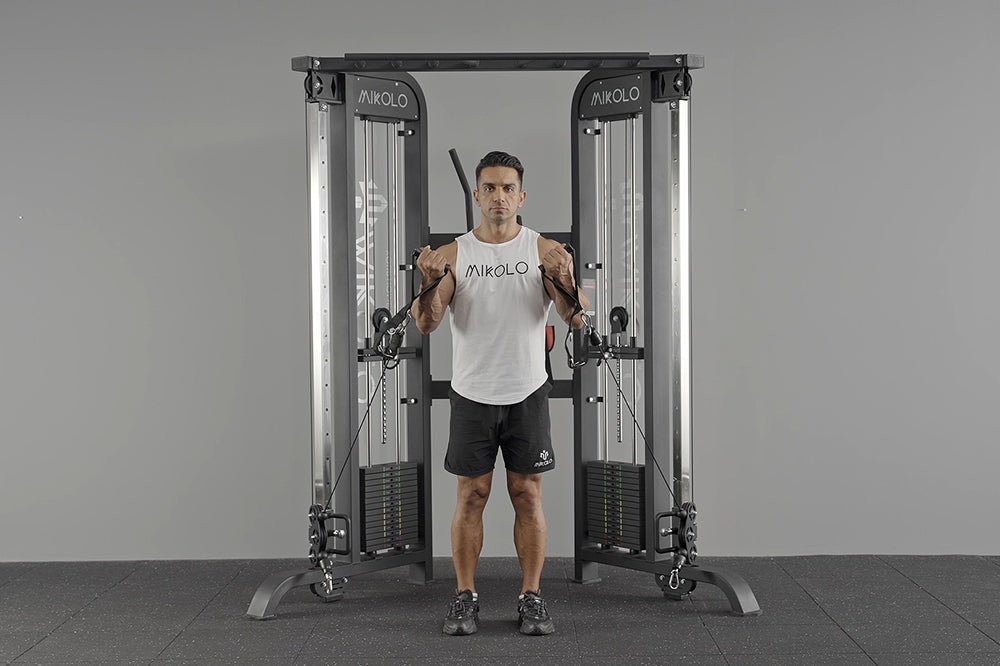If you've ever swapped your barbell for dumbbells on chest day and felt like you were struggling with far less weight, you're not alone. Many lifters—beginners and seasoned athletes alike—find the dumbbell bench press more challenging than its barbell counterpart. But why is that the case? Let’s break down the mechanics, muscle engagement, and training effects to understand this common gym phenomenon.
1. Stabilization Demands Are Higher
The biggest reason dumbbell bench presses feel harder is the demand they place on stabilizing muscles. With a barbell, your hands are fixed on the bar, and the bar itself provides balance. Dumbbells, however, move independently—meaning each side of your body must work on its own to press and control the weight. Your chest, shoulders, triceps, and even your core are constantly firing to stabilize and guide the weights through the range of motion.
If you’ve ever felt your arms wobble on the first few reps of a dumbbell press, that’s your stabilizers working overtime—especially muscles like the rotator cuff and serratus anterior, which aren’t as taxed during barbell pressing.
2. Longer Range of Motion
Dumbbells allow for a greater stretch at the bottom of the movement and a fuller contraction at the top. This increased range of motion recruits more muscle fibers, especially in the pecs. That might sound like a good thing—and it is—but it also makes the lift more difficult. You’re doing more work per rep, which adds up quickly, even with lighter weights.
3. No Strength Transfer Guarantee
A common mistake is assuming that if you can bench 200 lbs on a barbell, you should easily handle 100 lbs per hand with dumbbells. Unfortunately, it doesn’t work that way. Dumbbell strength doesn’t scale directly with barbell strength due to the added coordination and balance required.
Even advanced lifters often press significantly less with dumbbells than with a barbell—sometimes 20–30% less. It’s not a sign of weakness; it’s a sign the movement is working differently.
4. Left-Right Imbalances Get Exposed
When pressing with a barbell, your stronger side can compensate for your weaker side. But with dumbbells, there's nowhere to hide. Each arm has to carry its own load. That’s why dumbbell pressing is so effective for identifying and correcting muscular imbalances—but also why it can feel so much harder.
5. Personal Experience: Humbled by the Switch
When I first transitioned from years of barbell benching to dumbbells, I expected a smooth ride. I was benching 275 lbs for reps, but when I picked up 90 lb dumbbells, I barely made it through my second set. My form broke down, my shoulders felt shaky, and I had to drop down to 70s just to maintain control. Within a few weeks, though, my pec development improved, and my shoulder health actually got better. Dumbbells didn’t just humble me—they made me better.
6. Why Choose the Harder Route?
Despite the difficulty, dumbbell bench presses offer several advantages:
-
Better muscle activation: Thanks to the deeper stretch and fuller contraction.
-
Improved joint health: The freedom of movement allows for a more natural path, reducing strain.
-
Balanced development: Each arm and side of the chest gets equal attention.
-
Core engagement: The need to stabilize the weights activates your entire midsection.
That said, barbell bench press remains king for maximal strength. It allows for heavier loads, progressive overload, and straightforward setup—especially beneficial in powerlifting or strength phases.
7. Final Thoughts
So, is dumbbell press harder than bench press? In many ways, yes. It demands more stabilization, exposes weaknesses, and challenges your muscles with greater range and control. But with that difficulty comes reward. By incorporating both into your training, you’ll build a more complete chest, improve your shoulder health, and enhance overall strength balance.
Whether you’re lifting 48 lb dumbbells or working toward that first clean set with 90s, embracing the challenge of dumbbell pressing will pay off in the long run.









































Leave a comment
This site is protected by hCaptcha and the hCaptcha Privacy Policy and Terms of Service apply.